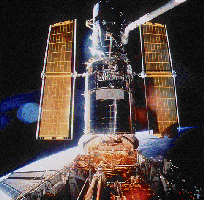

PHY 2003 Modern Physics - 2000 Summer
Course syllabus: please read carefully.
Instructor: Dr.
Ringwald
|
Phone: 321-674-7135
Also: 321-674-8098 (secretary)
|
Office: S418 Crawford, 4th floor
Office hours: MWF 3:30-5 and by appointment,
but please e-mail or phone first.
Course Description (from the 1999-2000 University Catalog):
(3 credits).
Topics include quantum mechanics of atoms, molecules, nuclei, solids, and
fundamental particles. Planck's and de Broglie's laws, the Bohr model of
hydrogen, elementary examples of Schroedinger's equation, relativity,
elementary particles and symmetry, quantum electrodynamics and
chromodynamics.
Prerequisites: PHY 2002, MTH 2001; corequisite: MTH 2201
Course meeting times and location:
MWF 2-3:15 p.m. in A102, Skurla Hall.
First class: Monday, May 15.
Last class (final exam): Friday, July 28.
Holiday: Monday, May 29 (and not Monday, July 3 or Wednesday, July
5).
Required course text: Modern Physics, second edition, by Kenneth
Krane (1996).
On reserve at Evans Library:
Fundamentals of Physics, 5th edition, by Halliday, Resnick,
and Walker.
This should be useful for reviewing waves, diffraction, and
interference.
Spacetime Physics, by Edwin F. Taylor and John Archibald
Wheeler.
The quintessential introduction to Special Relativity, for
freshmen
The Feynman Lectures on Physics, Volumes I-III, by Richard P.
Feynman, Robert B. Leighton, & Matthew Sands
Tentative Course Schedule:
- Ch. 1. Introduction and Review of Classical Physics.
Read also the course
rules and this entire syllabus.
- Ch. 2. The Special Theory of Relativity
The Michelson-Morley Experiment, Basic Postulates, Time Measurements,
Length Measurements, Lorentz Transformation, Transformation of Velocities,
Relativistic Momentum and Energy, Relativistic Doppler Effect
- Ch. 3. The Particle-like Properties of Electromagnetic
Radiation
Photons, The Photoelectric Effect, Blackbody (thermal) Radiation, Compton
Effect
- Ch. 4. The Wave-like Properties of Particles
De Broglie's Hypothesis, Heisenberg's Uncertainty Principle, Wave Packets,
Probability Amplitude
- Ch. 5. The Schroedinger Equation
Justification of Schroedinger's Equation, Wavefunctions, Normalization,
Applications, Simple Harmonic Oscillator, Time-Dependent Wavefunctions,
Step and Barrier Potentials
- Ch. 6. The Rutherford-Bohr Model of the Atom
Rutherford's Nuclear Atom Model, Bohr's Model, Franck-Hertz Experiment
(skip Section 6.7)
- Ch. 7. The Hydrogen Atom in Wave Mechanics
3-D Schroedinger Equation, Hydrogen Atom Wavefunctions, Radial Probability
Densities, Angular Momentum, Intrinsic Spin Angular Momentum, Energy
Levels and Spectroscopy (skip Sections 7.7 and 7.8)
- Ch. 8. Many-Electron Atoms
Pauli Exclusion Principle, Electronic States in Many-Electron Atoms,
Periodic Table, Properties of the Elements, X-rays (skip Section 8.7),
Optical Spectra, Lasers
- Ch. 9. Molecular Structure
The Nature of the Chemical Bond; Molecular Vibrations, Rotations, and
Spectra
- Ch. 10. Statistical Physics
Maxwell-Boltzmann Distribution, Bose-Einstein Statistics, Fermi-Dirac
Statistics
- Ch. 11. Solid-State Physics
Ionic Solids, Covalent Solids, Band Theory of Solids, Electrons in Metals,
Superconductivity, Semiconductors
- Ch. 12. Nuclear Structure and Radioactivity
Rutherford's Nuclear Model, Nuclear Properties, Binding Energy, Nuclear
Force, Radioactive Decay, Alpha and Beta Particle Decay, Radioactive
Dating, the Moessbauer Effect
- Ch. 13. Nuclear Reactions and Applications
Nuclear Fission, Nuclear Reactors, Nuclear Fusion, Nuclear Processes in
Stars
- Ch. 14. Elementary Particles
Particles and Anti-Particles, Fermions and Bosons, Leptons, Conservations
Laws, Lepton Number, Baryon Number, Strangeness, Quark Model and the
Eight-Fold Way, Weak and Strong Force, the Standard Model
- Ch. 15. Astrophysics and General Relativity
Principle of Equivalence, General Theory of Relativity, Stellar Evolution,
Black Holes
- Ch. 16. Cosmology
Expansion of the Universe, Cosmic Microwave Background Radiation, Dark
Matter, Cosmology
Course grades will be determined by the following:
| Mid-term Exam 1, to be held Friday, June 16:
| 25%
|
| Mid-term Exam 2, to be held Wednesday, July 12:
| 25%
|
| Quizzes and Homework - PLEASE NOTE: No late homework will be
accepted:
| 25%
|
| Final Exam, which will be comprehensive, to be held on the last day of
class, Friday, July 28, in A102:
| 25%
|
Go to Dr.
Ringwald's home page
Last updated 2000 June 5.
Web page by Dr. Ringwald
Department of Physics and Space Sciences,
Florida Institute of Technology

